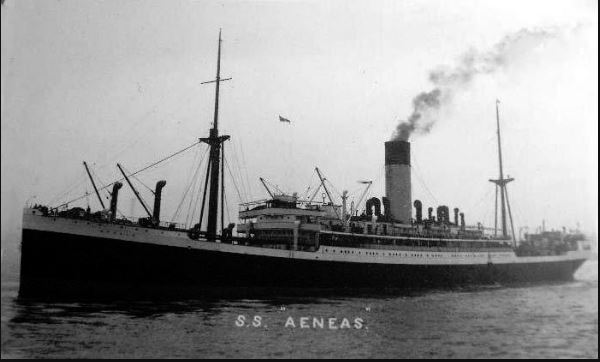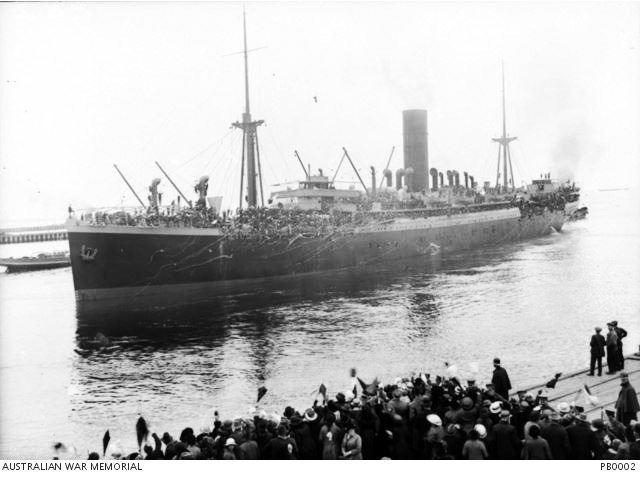Difference between revisions of "HMAT A60 Aeneas"
From Our Contribution
(→Melbourne to England 3 October - 19 November 1916) |
|||
| (9 intermediate revisions by the same user not shown) | |||
| Line 1: | Line 1: | ||
| − | {{Infobox | + | {{Infobox ship |
| − | | | + | | image = [[File:HMAT_A60_Aeneas_1.jpg|border|600px]] |
| − | |||
| − | |||
| − | |||
| − | |||
| − | |||
| − | |||
| caption = | | caption = | ||
| − | | | + | | image2 = [[File:HMAT_A60_Aeneas_Leaving_Port_Melbourne.jpg]] |
| − | | caption2 = | + | | caption2 = HMAT A60 Aeneas Leaving Port Melbourne |
| − | + | | shipname = HMAT A60 Aeneas | |
| − | + | | shipowner = Ocean Steam Ship Co, Ltd, Liverpool (Blue Funnel Line) | |
| − | + | | shipbuilder = Workman Clarke at Belfast | |
| − | + | | shipyardnumber = 294 | |
| − | + | | shiplaunched = | |
| − | | | + | | shipcompleted = 1910 |
| − | + | | shipinservice = | |
| − | | | + | | shipoutofservice = 4 Jul 1940 |
| − | | | + | | shipinservice2 = |
| − | + | | shipoutofservice2 = | |
| − | + | | shipreclassified = | |
| − | | | + | | shipID = |
| − | + | | shipfate = sunk by German bombers | |
| − | | | + | | shiptype = Passenger liner |
| − | | | + | | shiptonnage = 10,049 tons |
| − | + | | shiplength = 150.3m | |
| − | | | + | | shipbeam = 18.4 m |
| − | | | + | | shipdepth = 11.3m |
| − | + | | shippropulsion = twin screw | |
| − | | | + | | shipspeed = 14 knots (25.93 kph) |
| − | | | + | | shipcapacity = 180 x 1st class passegers |
| − | |||
| − | | | ||
| − | | | ||
}} | }} | ||
| Line 46: | Line 37: | ||
| − | In May 1918 after she left Commonwealth control, she ran aground, but was refloated, and in 1920 resumed her peacetime Australian service with capacity for 180 first class passengers. | + | In May 1918 after she left Commonwealth control, she ran aground, but was refloated, and in 1920 resumed her peacetime Australian service with capacity for 180 first class passengers. She was in convoy 21 miles S.E. of Start Point on July 2nd, 1940, when she was attacked by German bombers and finally sank on July 4th. As the vessel was the largest in the convoy she received particular attention from the enemy, one bomb passing through the port side and another going down the after cross-bunker trunkway and blowing out the starboard side. This bomb, which exploded deep within the ship, is assumed to have killed nearly all of the engineers and stokers on duty. 19 lives were lost. |
==Soldiers carried== | ==Soldiers carried== | ||
===Port Suez to Melbourne 31 October 1915 - 26 November 1915=== | ===Port Suez to Melbourne 31 October 1915 - 26 November 1915=== | ||
| + | Sailed on 3 Nov 1915 | ||
*[[Joseph George Benton Snr]] | *[[Joseph George Benton Snr]] | ||
*[[Ernest Wright Holroyd]] | *[[Ernest Wright Holroyd]] | ||
*[[John Charles Hutchinson]] | *[[John Charles Hutchinson]] | ||
| − | |||
===Fremantle to Port Suez 17 April - 14 May 1916=== | ===Fremantle to Port Suez 17 April - 14 May 1916=== | ||
| − | *[[Edward Armstrong]] | + | * [[Edward Armstrong]] |
| − | *[[Gordon Edgar (George) Bennett]] | + | * [[Gordon Edgar (George) Bennett]] |
| − | *[[Arthur Edward Bingham]] | + | * [[Arthur Edward Bingham]] |
| − | *[[Austin Henry (Paddy) Bingham]] | + | * † [[Austin Henry (Paddy) Bingham]] |
| − | *[[Percy James Blake]] | + | * [[Percy James Blake]] |
| − | *[[William Francis Clements]] | + | * [[William Francis Clements]] |
| − | *[[Gordon Vidgen Cross]] | + | * [[Gordon Vidgen Cross]] |
| − | *[[Joseph Charles Joshua Farnell]] | + | * [[Joseph Charles Joshua Farnell]] |
| − | *[[George Harris]] | + | * [[George Harris]] |
| − | *[[Robert Lightbody]] | + | * [[Robert Lightbody]] |
| − | *[[Ernest Clifford Noyce]] | + | * † [[Ernest Clifford Noyce]] |
| − | *[[Alexander Robinson]] | + | * [[Alexander Robinson]] |
| − | *[[Alfred Arthur (Fred) Rouse]] | + | * † [[Alfred Arthur (Fred) Rouse]] |
| − | *[[Keith Herbert Sloan]] | + | * [[Keith Herbert Sloan]] |
| − | *[[Herbert Winton Turner]] | + | * † [[Herbert Winton Turner]] |
| − | *[[John Francis Ullyott]] | + | * [[John Francis Ullyott]] |
| − | ===Melbourne to England | + | ===Melbourne to England 3 October - 19 November 1916=== |
*[[Norman Alfred Constantine]] | *[[Norman Alfred Constantine]] | ||
| Line 98: | Line 89: | ||
*[[Allan Bernard Cann]] Post WW1 men | *[[Allan Bernard Cann]] Post WW1 men | ||
*[[Frederick Arthur Lister Maw]] | *[[Frederick Arthur Lister Maw]] | ||
| + | |||
| + | ===Other Journeys=== | ||
| + | * 29-Jun-1915: from Brisbane, Queensland | ||
| + | * 20-Dec-1915: from Sydney, New South Wales | ||
| + | * 17-Apr-1916: from Freemantle, Perth | ||
[[Category:Ships]] | [[Category:Ships]] | ||
Latest revision as of 15:27, 12 October 2021
Contents
- 1 Remarks
- 2 Soldiers carried
- 2.1 Port Suez to Melbourne 31 October 1915 - 26 November 1915
- 2.2 Fremantle to Port Suez 17 April - 14 May 1916
- 2.3 Melbourne to England 3 October - 19 November 1916
- 2.4 Melbourne to Devonport 30 October - 27 December 1917
- 2.5 England to Fremantle 19 December 1918 - 27 January 1919
- 2.6 England to Fremantle 31 May - 12 July 1919
- 2.7 England to Melbourne 22 November 1919 - 9 January 1920
- 2.8 Other Journeys
Remarks
Built for Ocean Steam Ship Co (Blue Funnel Line) for the South Africa - Australia service. Trip took 39 days and operated every six weeks.
Requisitioned by the Commonwealth for use as a troopship for four voyages from Australia and one as a cargo ship in 1917. Fitted out at Cockatoo Island in Sydney to carry 1,820 troops. She made several trips to England carrying reinforcements. Management was transferred to the British Admiralty on 22 Jun 1917.
In May 1918 after she left Commonwealth control, she ran aground, but was refloated, and in 1920 resumed her peacetime Australian service with capacity for 180 first class passengers. She was in convoy 21 miles S.E. of Start Point on July 2nd, 1940, when she was attacked by German bombers and finally sank on July 4th. As the vessel was the largest in the convoy she received particular attention from the enemy, one bomb passing through the port side and another going down the after cross-bunker trunkway and blowing out the starboard side. This bomb, which exploded deep within the ship, is assumed to have killed nearly all of the engineers and stokers on duty. 19 lives were lost.
Soldiers carried
Port Suez to Melbourne 31 October 1915 - 26 November 1915
Sailed on 3 Nov 1915
Fremantle to Port Suez 17 April - 14 May 1916
- Edward Armstrong
- Gordon Edgar (George) Bennett
- Arthur Edward Bingham
- † Austin Henry (Paddy) Bingham
- Percy James Blake
- William Francis Clements
- Gordon Vidgen Cross
- Joseph Charles Joshua Farnell
- George Harris
- Robert Lightbody
- † Ernest Clifford Noyce
- Alexander Robinson
- † Alfred Arthur (Fred) Rouse
- Keith Herbert Sloan
- † Herbert Winton Turner
- John Francis Ullyott
Melbourne to England 3 October - 19 November 1916
Melbourne to Devonport 30 October - 27 December 1917
- Joseph George Benton Jnr
- Ernest Camp
- Reginald William Edwards
- Dugald Thomas Main
- Ellis Shackleton
- Peter Grant Watt
- Archibald Watson
England to Fremantle 19 December 1918 - 27 January 1919
- Thomas Albert Leslie Cheney
- Denzel Roy (Roy) Fletcher Post WW1 - boarded in Suez on 1 Jan 1919
- John Laidlaw Paterson
- Alfred Haddy Pearse
England to Fremantle 31 May - 12 July 1919
England to Melbourne 22 November 1919 - 9 January 1920
- Allan Bernard Cann Post WW1 men
- Frederick Arthur Lister Maw
Other Journeys
- 29-Jun-1915: from Brisbane, Queensland
- 20-Dec-1915: from Sydney, New South Wales
- 17-Apr-1916: from Freemantle, Perth

